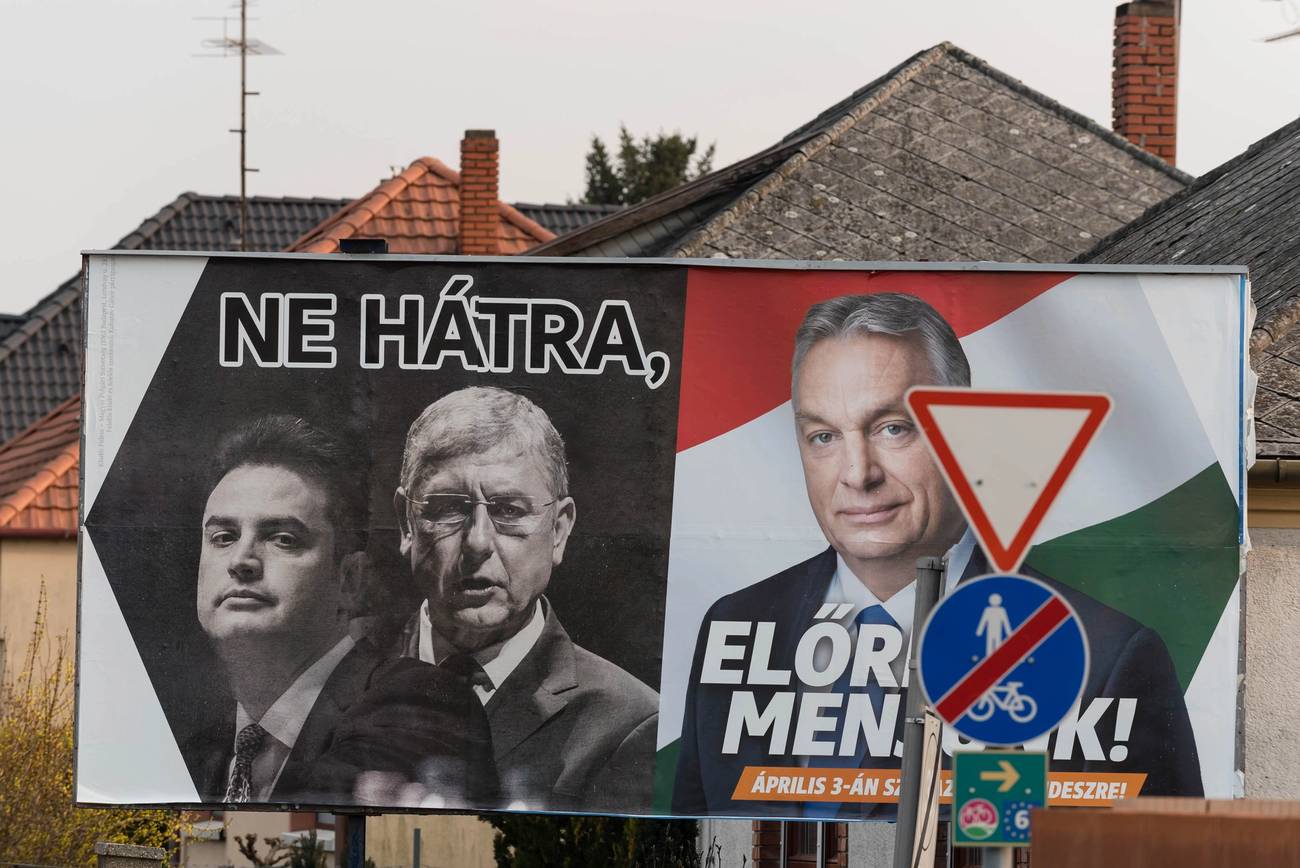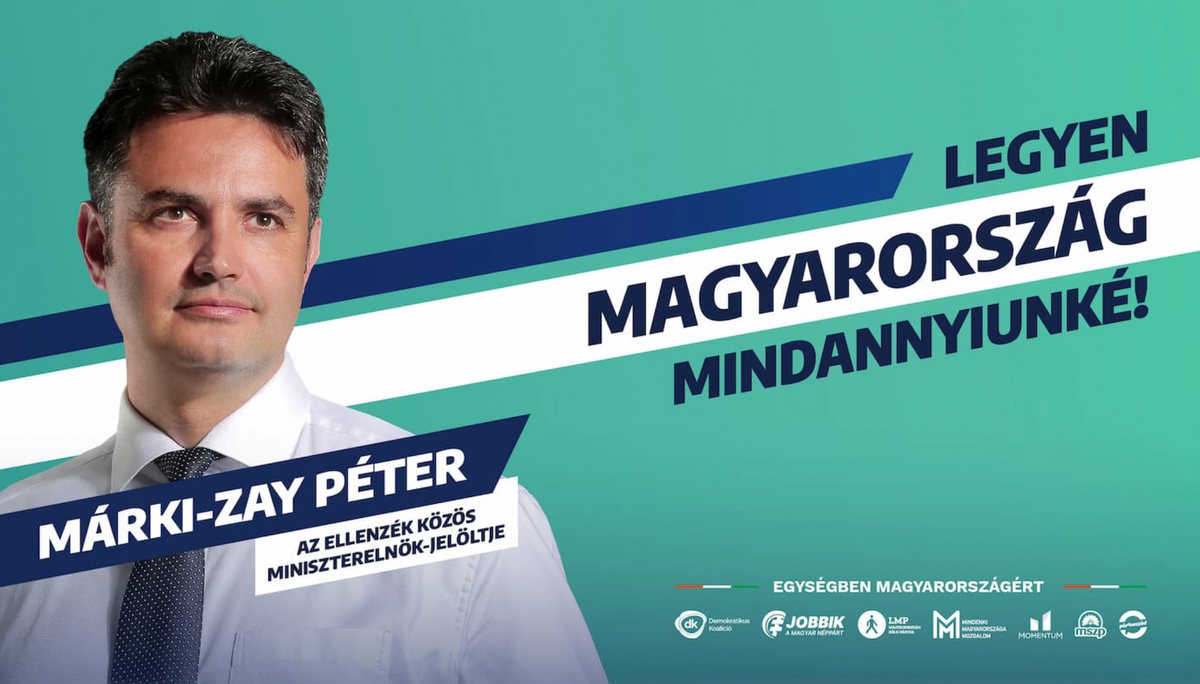Decision on the Danube
I reclaimed my Hungarian citizenship just in time to vote in Sunday’s historic election



For the first time in my long life, I will be voting on Sunday in a Hungarian election. That’s because after talking about it for years without much action, in the fall of 2020, when there was little else to do, I finally jumped through the necessary bureaucratic hoops to obtain my Hungarian passport. Born in Budapest but having left the country as a young child in 1949 (at the time, my family was declared “stateless,” refugees from the Holocaust and from communism), I was entitled to reclaim my Hungarian citizenship, provided I could furnish my birth certificate, my mother’s birth certificate, and my parents’ marriage certificate, among other pieces of paper. I did.
Last June, the passport arrived in the mail: Deep red like all the European Union passports, it bears Hungary’s emblem, the shield of Saint Stephen, on its cover, along with the words ÚTLEVÉL (Passport) and Magyarország (Hungary). In earlier, more democratic times, official documents named the country Magyar Köztársaság, Hungarian Republic, but one of the Orbán government’s many changes to the constitution since 2010 was dropping “Republic” from the country’s name. Inside, my own name looks strange to me: Suleiman, Zsuzsanna Magdolna, my first and middle names just as they appear on my birth certificate.
I am now the owner of two passports, my split identity embodied in the red and the blue. The red one entitles me to stand in the shorter “EU Passports” line at Charles de Gaulle Airport in Paris, a precious advantage to travelers. More importantly, it also allows me to vote in the parliamentary elections on April 3. Having written extensively over the past few years about the autocratic tendencies of the Orbán regime, which has been in power since 2010, I treasure the opportunity to cast a vote—all the more so because, for the first time since then, it looks like Orbán’s party, Fidesz, will face a well-organized opposition. According to recent polls, the opposition candidates present a real challenge to the party in power.
Four years ago, Fidesz won a supermajority in Parliament even though it received less than 50% of the actual votes—a quirk in Hungary’s election rules that, like America’s electoral college system, can similarly override the popular vote. Fidesz’s victory was due in large part to the still hot-button issue of the 2015 migrant crisis, which it exploited through a long-running campaign against George Soros, whom it portrayed as the architect of a “plan” to overwhelm Christian Europe with refugees “from Africa and the Middle East” (read: Blacks and Muslims). Its two-thirds majority allowed Fidesz to push through a number of important constitutional changes to its advantage.
The other reason for Fidesz’s victory in 2018 was that the opposition parties were splintered, allowing for a “divide and conquer” strategy. Calls for a coalition of the opposition parties against Fidesz, notably by the highly respected philosopher Agnes Heller, fell on deaf ears back then, largely because the left-leaning parties could not bring themselves to form an alliance with the right-wing party, Jobbik. Founded in 2003, Jobbik in its early years was notorious for its racist and rabidly nationalist pronouncements. Starting in 2017, however, it began to moderate its positions, so that today it is considered to be to the left of Fidesz. Jobbik’s most rabid members broke off from the party after the 2018 elections and founded their own party, Our Homeland (Mi Hazánk), which is polling at about 3%-4% in the upcoming elections. Jobbik, meanwhile, has become what one Hungarian friend calls “presentable in good society” (szalonképes). It is now the second-ranking member, in terms of numbers, of the six-party coalition that constitutes the united opposition, known as “United for Hungary” (Egységben Magyarországért, or EM). Agnes Heller, who survived the Holocaust as a teenager and died in 2019 at age 90, must be turning happily in her grave. She always believed that a united opposition against Fidesz was necessary, even if it meant an alliance with Jobbik.
Aside from Jobbik, the other members of the alliance are all left or left-leaning. The largest member is the DK (Democratic Coalition) party, split off from the Socialists, whose head is the former Socialist Prime Minister Ferenc Gyurcsány (2004-09). Then there is the Socialist Party (MSZP) itself, which is now smaller than Jobbik and is allied with a tiny party named Párbeszéd (Dialogue); Momentum, a largely urban, liberal party formed in 2018 that attracts many young people and intellectuals; and the Green party, LMP (the acronym stands for “Politics Can be Different”).
Excluded from the alliance, and not expected to receive enough votes to enter Parliament (a minimum of 5% of the total vote is required), are the ultra-right “Our Homeland” party and the surreally named “Hungarian Two-Tailed Dog Party” (MKKP), whose slogan is “Eternal Life, Free Beer, Reduced Taxes,” and whose absurdist humor has an actual following (about 2%), largely because of its anti-corruption stance critical of the Orbán regime. In a January 2022 poll, Fidesz (with its partner KDNP, a Christian Democratic party) stood at 38%, while the united opposition had 36%. In February the numbers shifted somewhat in Fidesz’s favor, 39% to 32% respectively. In both polls, 20% of respondents declared themselves undecided.
Clearly, then, the undecideds will decide the election. One clever move by the opposition alliance was to designate a prime minister candidate, Péter Márki-Zay, who it hopes will appeal to a large swath of voters, including the rural and small-town electorate that has consistently voted for Orbán. Although Fidesz has tried to paint Márki-Zay as a socialist and “Gyurcsány’s man” (the former prime minister is unpopular among many voters, who remember the corruption under his watch), it’s almost comical to think of the coalition candidate as a left-winger.
Unaffiliated with any party (he recently founded a movement he calls “Everybody’s Hungary Movement”), Márki-Zay, 49, is a Roman Catholic from a conservative family, the father of seven children, an electrical engineer, and a marketing specialist who also holds a doctorate in economic history from a Hungarian university; he spent five years in Canada and the United States, working for large corporations. Perhaps most importantly from the opposition’s perspective, he is not seen as a big-city intellectual, despite his years abroad and his fluency in several languages. He was born and raised in a small southern city on the Great Hungarian Plain, whose name is virtually unpronounceable by any but “true” Hungarians. The population of Hódmezővásárhely (Hoed-mezuh-vah-shar-hey) is approximately 45,000; compared to cities like Debrecen (population 200,000), Miskolc (165,000), or Szeged (162,000), not to mention Budapest (1.8 million), Hódmezővásárhely is practically an oversized village. Márki-Zay has been its mayor since 2017, when he was drafted to run in a by-election after the sitting mayor died, and was reelected in 2018. That has been his only political experience until now.

In his TV appearances, Márki-Zay comes across as forthright and well-spoken, an energetic and attractive candidate who affirms his love of Hungary even while proclaiming his solidarity with the European Union, which Orbán prides himself on defying (while simultaneously accepting its generous subsidies). Márki-Zay, along with the rest of the opposition coalition, regularly attacks the Orbán regime for its corruption and its infringement of democratic norms, both of which have been amply documented. Since the 2018 election, the governing party, with its two-thirds majority, has sought to take over the judiciary and the universities, in addition to completely quashing the free press. It has not fully succeeded until now, but has accomplished many of its goals toward what Orbán calls “illiberal democracy.” According to Márki-Zay, the “silent majority” in Hungary, to which he is appealing, is only silent because it is afraid.
According to Márki-Zay, Hungary’s ‘silent majority’ is only silent because it is afraid.
The opposition’s other strategy that may prove successful is its distribution of various parliamentary candidates from different parties according to the political preferences of each district. In the northeast, around the city of Debrecen, for example, an area known for its conservatism, many of the opposition candidates are from Jobbik, while in the areas around Budapest the candidates tend to be from Momentum or the DK. Whereas in earlier elections these parties would have split the opposition votes among themselves, the broad opposition coalition allows them to back each other, despite their real political differences. As a kind of coalition anthem, they have adopted Patti Smith’s “The People Have the Power,” which is often sung at rallies (in Hungarian, of course). Patti Smith, for her part, has sent them a video of encouragement.
Still, it would be a mistake to underestimate the campaigning power of Fidesz. Among its tried and true campaign methods is that of the “national consultation,” designed to mobilize voters around a perceived impending threat by asking them pointed questions that already contain an answer. In the run-up to the 2018 election, for example, voters were sent a questionnaire in the mail about the threat of migrants. A typical question ran as follows: “Are you in favor of Soros’ plan to flood Europe with African and Middle Eastern refugees, forcing sovereign nations to accept them and give them money? Answer Yes or No.”
This year, the subject has changed but the tactic remains the same. In the April 3 election, voters will be presented with a referendum (more consequential, and binding, than a mere national consultation) consisting of four questions on the subject of “child protection”: Question 1: Are you in favor of teaching minor children in educational institutions about sexual orientation, without their parents’ consent? Question 2: Are you in favor of popularizing sex change treatments for minor children? Question 3: Are you in favor of introducing minor children to unlimited sexual content in the media that will influence their development? Question 4: Are you in favor of presenting media content about sex change? Not to be outdone by the absurdity of the Fidesz questions, the Two-Tailed Dog Party has recommended that voters choose both YES and NO on each one.

In fact, the issue of “child protection” (from LGBTQ issues) was already exploited by the government last year, when it passed a law against sex education in schools, provoking an outcry and accusations of bigotry from the European Union. The law conflated nontraditional sexual orientation, specifically homosexuality, with pedophilia. But just as George Soros proved to be an effective scapegoat in 2018, with posters to match, so the scapegoating of LGBTQ people should prove effective this year. That at least appears to be the hope of the Orbán government, which has plastered huge posters all over the country showing a mother holding her little girl close to her chest. “Let’s Protect The Children!” runs the headline above the photo; below it is the message, “Let’s vote No on April 3.”
Perhaps the biggest unknown at the moment is how the war in Ukraine will affect voters, especially among the undecideds. On the one hand, Orbán’s longtime pro-Russia stance and his proclaimed admiration for Vladimir Putin—which he is now having to walk back—may turn voters toward the opposition coalition, whose members are loudly and unanimously affirming solidarity with Ukraine. (At a recent coalition campaign meeting, every candidate wore a blue and yellow ribbon.) Orbán, for his part, has to walk a tightrope, approving of sanctions against Russia as a member of the EU but also trying to reassure Fidesz’s base, to which he has been preaching a pro-Russia message for many years.
On the other hand, it’s possible that undecided voters will turn toward the party in power in April, on the grounds that it’s not safe to change horses in the middle of a major international crisis. Orbán is helped by the fact that the EU, which has caused Hungary trouble recently over regulatory infringements pertaining to human rights, is now too busy with the Ukraine crisis to pursue punitive actions against a member state—not to mention that Orbán may have exacted promises from the EU in exchange for his support of the union’s sanctions against Russia. At the very least, however, the united opposition can hope to prevent Fidesz from obtaining another supermajority, thus preventing any more “illiberal” changes to the constitution.
As readers have undoubtedly guessed by now, my own vote on Sunday is not undecided. I am grateful to have a chance to express my opinion as a newly documented citizen of my native country, where, despite its autocratic tendencies, elections have so far been free and fair. Even “illiberal democracy” in Hungary is better than the totalitarianism that prevailed until 1989. For one thing, it makes possible a hope for peaceful change.
Susan Rubin Suleiman is professor emerita at Harvard University and the author, most recently, of The Némirovsky Question: The Life, Death, and Legacy of a Jewish Writer in Twentieth-Century France.